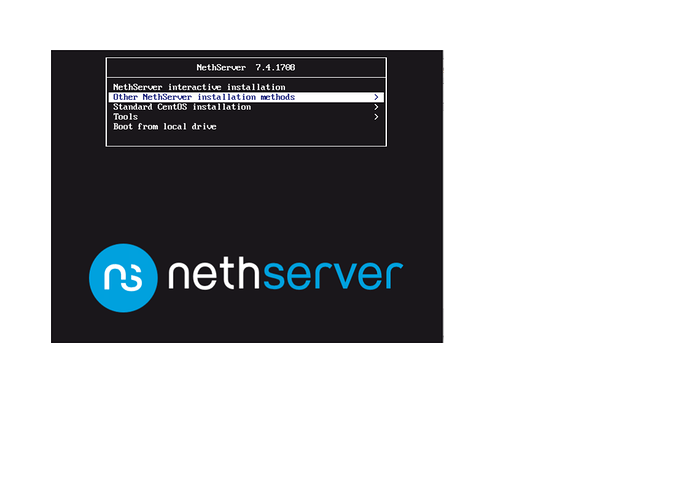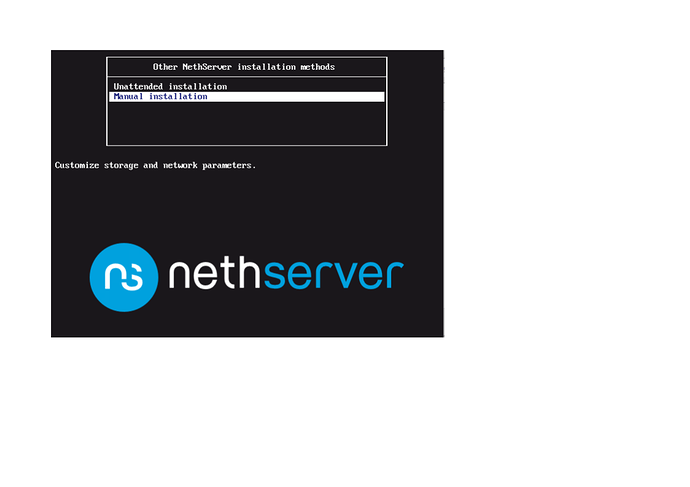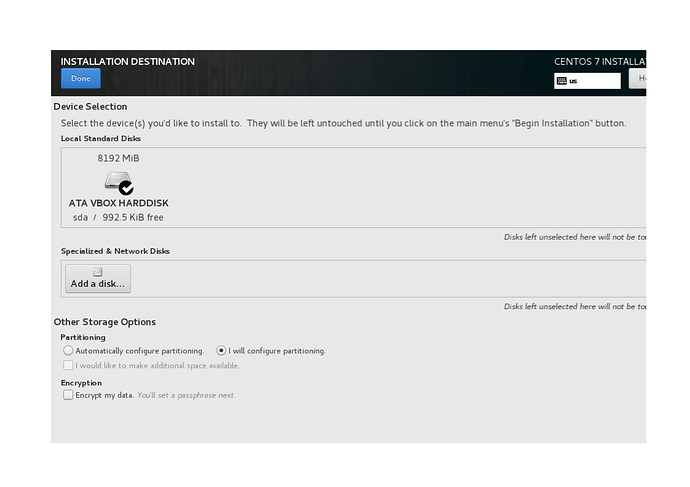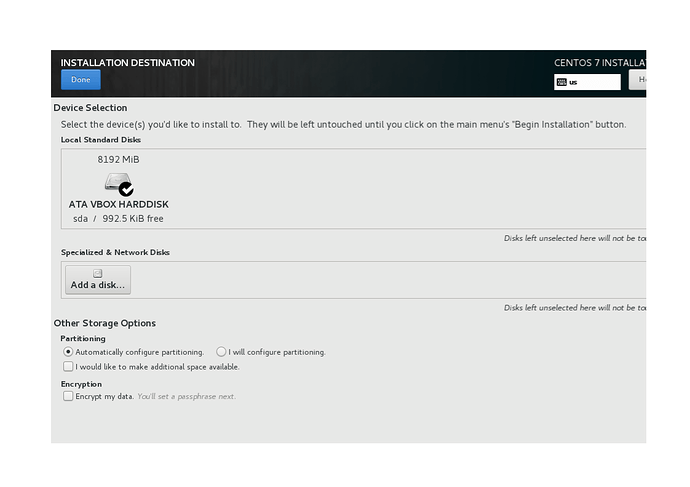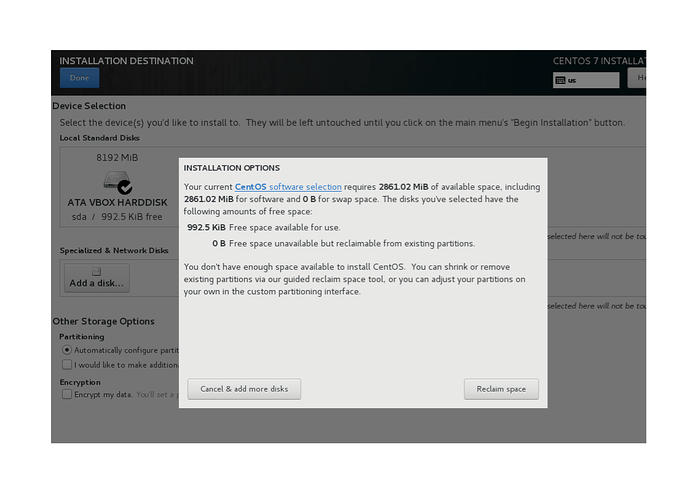Pitmaster
November 30, 2017, 9:13am
1
Version 7 Install
I was supprised to see the same problem later on school when I was showing a student Nethserver on a Hyper-V VM, setting up the destination drive failed with the same reason.
Is this a bug? Is there a fix? Work around?
Thanks in advance Pitmaster.
giacomo
November 30, 2017, 10:26am
2
Anaconda should be able to clear all partitions, but I know that sometimes it can fail.
jgjimenezs
November 30, 2017, 10:53am
3
Pitmaster:
I have tried to install Nethserver on a Intel NUC. When setting up the destination drive the process failed. Nethserver is seeing a Volumegroup with a xfs partition. I thought the problem was that I have had Freenas running on this machine before trying Nethserver.
I was supprised to see the same problem later on school when I was showing a student Nethserver on a Hyper-V VM, setting up the destination drive failed with the same reason.
Is this a bug? Is there a fix? Work around?
Thanks in advance Pitmaster.
How are you doing @Pitmaster ? at the time of installation you are using which steps: unattended, manual, etc?
Pitmaster
November 30, 2017, 1:45pm
4
Hi Jose, thanks for reacting m8. The problem is also there where try to make a manual setup of the drive.
Your hint for installing a native CentOS is a good one but I amnow on work, I can try this tonight.
Pit
Pitmaster
November 30, 2017, 5:42pm
5
Using native CentOS did the trick. It acted normal on setting up the destination drive and installed normally. After that I installed native Nethserver 7 and working. Thx you both.
Pit
Could you please send here the /root/anaconda.ks.cfg from the successful installation?
jgjimenezs
November 30, 2017, 7:05pm
7
Pitmaster:
Using native CentOS did the trick. It acted normal on setting up the destination drive and installed normally. After that I installed native Nethserver 7 and working. Thx you both.
Pit
I have installed the manual form, attached screens of the steps I do.
Have you had any problems with this step?
I have done this both in virtualbox and workstations/servers
2 Likes
Pitmaster
November 30, 2017, 7:49pm
8
[root@mail ~]# cat anaconda-ks.cfg
#platform=86, AMD64, or Intel EM64T
#version=DEVEL
# Install OS instead of upgrade
install
# Use CDROM installation media
cdrom
# Use graphical install
graphical
# Firewall configuration
firewall --disabled
firstboot --disable
ignoredisk --only-use=sda
# Keyboard layouts
keyboard --vckeymap=us-euro --xlayouts='us (euro)'
# System language
lang en_US.UTF-8
# Installation logging level
logging --level=debug
# Network information
network --bootproto=static --device=enp3s0 --gateway=192.168.0.1 --ip=192.168.0.5 --nameserver=8.8.8.8,8.8.4.4 --netmask=255.255.255.0 --ipv6=auto --activate
network --hostname=localhost.localdomain
# Reboot after installation
reboot --eject
# Root password
rootpw --iscrypted $6$/KCkCHSSQ3zOp/aG$QSw2Qt72DcHwLi3yMCPOGe6nIcOQ/TtWx4pmpvEsF1vJuE26wzmibfZHDk10r5e4DIUa3Ac03LRhDHrS5cif9.
# SELinux configuration
selinux --permissive
# System services
services --enabled="chronyd"
# Do not configure the X Window System
skipx
# System timezone
timezone Europe/Amsterdam
user --groups=wheel --name=nico --password=$6$KJWIAvUBvLcG5WX2$gnrPR9AoQch4OuLCF62Wgih1RdjQ2OJ/Qbv7pYf9B0InmoYuKsr/Ph3GUV67zrN0xFyHZfBSpRhxou50cMnGZ/ --iscrypted --gecos="Nico Berg"
# System bootloader configuration
bootloader --location=mbr --boot-drive=sda
reqpart --add-boot
# Clear the Master Boot Record
zerombr
# Partition clearing information
clearpart --all --drives=sda
# Disk partitioning information
part pv.148 --asprimary --fstype="lvmpv" --ondisk=sda --size=952844
part /boot --fstype="xfs" --size=1024
volgroup VolGroup --pesize=4096 pv.148
logvol / --fstype="xfs" --grow --size=5000 --name=lv_root --vgname=VolGroup
logvol swap --fstype="swap" --size=7936 --name=lv_swap --vgname=VolGroup
%pre
# eval options
set -- `cat /proc/cmdline`
for I in $*; do case "$I" in *=*) eval $I;; esac; done
# Determine how many drives we have
if [ -z "$disks" ]; then
disks=()
tmp=( $(list-harddrives | cut -d' ' -f 1) )
for d in "${tmp[@]}"
do
if [[ $d == md* ]]; then
# skip md raid devices
continue
fi
mount | grep -q /dev/$d
if [ $? -gt 0 ]; then
disks+=($d)
fi
done
numd=${#disks[@]}
d1=${disks[0]}
d2=${disks[1]}
else
d1=`echo $disks | awk 'BEGIN { FS = "," } ; { print $1 }'`
d2=`echo $disks | awk 'BEGIN { FS = "," } ; { print $2 }'`
if [ -z "$d2" ]; then
numd=1
else
numd=2
fi
fi
if [ $numd -lt 2 ] || [ $raid = "none" ] ; then
cat <<EOF >> /tmp/part-include
# 1 disk, no raid
part /boot --fstype xfs --size 1024
part pv.1 --asprimary --fstype='physical volume (LVM)' --ondisk=$d1 --size=5000 --grow
EOF
echo "bootloader --location=mbr " > /tmp/bootloader-include
elif [ $numd -ge 2 ]; then
cat <<EOF >> /tmp/part-include
# 2 disks, raid 1
part raid.00 --asprimary --fstype='raid' --ondisk=$d1 --size=1024 # boot
part raid.01 --asprimary --fstype='raid' --ondisk=$d1 --size=5000 --grow# root
part raid.10 --asprimary --fstype='raid' --ondisk=$d2 --size=1024 # boot
part raid.11 --asprimary --fstype='raid' --ondisk=$d2 --size=5000 --grow# root
raid /boot --device=md1 --fstype='xfs' --level=1 raid.00 raid.10
raid pv.1 --device=md2 --fstype='physical volume (LVM)' --level=1 raid.01 raid.11
EOF
echo "bootloader --location=mbr " > /tmp/bootloader-include
fi
# enable dhcp on all network interfaces
for net in `find /sys/class/net/ -mindepth 1 ! -name lo | cut -d '/' -f5`; do
echo "network --activate --onboot=yes --bootproto=dhcp --device=$net" --nameserver=8.8.8.8 >>/tmp/network-include
done
# set encrypted fs
if [ -z $fspassword ]; then
echo "logvol / --fstype xfs --name=lv_root --vgname=VolGroup --size=5000 --grow" > /tmp/rootfs-include
else
echo "logvol / --fstype xfs --name=lv_root --vgname=VolGroup --size=5000 --grow --encrypted --passphrase=$fspassword" > /tmp/rootfs-include
fi
%end
%post --interpreter=/bin/bash
exec 1>/root/kickstart-post.log 2>&1
echo "Enabling first-boot..."
touch /var/spool/first-boot
echo "Importing RPM GPG keys..."
rpm --import /etc/pki/rpm-gpg/*
echo "Enable nethserver units..."
systemctl enable nethserver-system-init
systemctl enable nethserver-config-network
systemctl disable NetworkManager firewalld
echo "Disable kdump..."
systemctl disable kdump
if [ -f /etc/nethserver-release ]; then
echo "Fix /etc/issue..."
cp -f /etc/nethserver-release /etc/issue
echo -e 'Kernel \\r on an \\m\n' >> /etc/issue
fi
%end
%packages
@core
@nethserver-iso
chrony
%end
%addon com_redhat_kdump --disable --reserve-mb='auto'
%end
I need to finish more tests, but I’m sharing what I found:clearpart --all --drives=sdaclearpart --all.
–all - Erases all partitions from the system.
from:
This manual explains how to boot the Red Hat Enterprise Linux 7 installation program (Anaconda) and how to install Red Hat Enterprise Linux 7 on AMD64 and Intel 64 systems, 64-bit ARM systems, 64-bit IBM...
Then the example in the manual says to use clearpart --drives=hda,hdb --all which is similar to what we can find in your kickstart.
